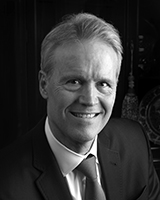
David B. Hellmann,
MD, MACP
As I was reading over the stories in this issue of Breakthrough, the name of a currently popular movie came to mind: Everything Everywhere All at Once. The all-encompassing nature of the title of this award-winning film is an apt descriptor, I believe, of the incredibly far-reaching, broad-ranging efforts that so many CIM faculty and trainees are engaged in to advance the work of CIM’s Initiative for Humanizing Medicine.
Consider the work of physician/bioethicist Mary Catherine Beach, for example, who is co-founder of the Initiative for Humanizing Medicine and the Mary and David Gallo CIM Scholar, whose research focuses on how respect and communication play out between patients and clinicians. She’s found that the language doctors use in patient medical records can stigmatize patients, impacting future care and perpetuating health inequities. As you’ll read on p. 2, Mary Catherine has emerged as a national leader in addressing this issue.
You’ll also learn about the work of two CIM-affiliated physicians — one a rising star, the other an established international expert — who are both pushing exciting advances to improve the lives of countless patients. Michelle Sharp, a Mary and David Gallo Scholar, has her sights on improving care and treatment for sarcoidosis, a difficult-to-diagnose condition that can impact virtually every organ in the body (p. 8). Constantine Lyketsos, the Alafouzos CIM Scholar and a world-renowned leader in Alzheimer’s disease care and research, is leading promising precision medicine solutions to dementia — solutions using stem cell technology that could be targeted “to reach the right patient at the right time with the right treatment,” as he describes on p. 16.
Of course, giving the next generation of physicians the tools they need to get to know patients as people is crucial. Toward that end, we share the story of Osler medical resident Amol Gupta, and his Medicine Mentors Podcast and a spin-off Personomics podcast, which are both aimed at medical trainees (p. 14). And I think you will be particularly intrigued by the efforts of psychiatrist Meg Chisolm. A member of the Miller Coulson Academy of Clinical Excellence, Meg is a passionate leader in art museum-based medical education, which, as she explains on p. 18, can prepare doctors who are better equipped to deliver humanized care.
There’s more, much more, in this Breakthrough, so I invite you to read it from cover to cover. And I’ll end with a big thank-you. Without your generous support, we would not be able to mount such ambitious, impactful projects — Everything Everywhere All at Once —that have the potential to transform the very future of health care.

David B. Hellmann, M.D., M.A.C.P.
Aliki Perroti Professor of Medicine